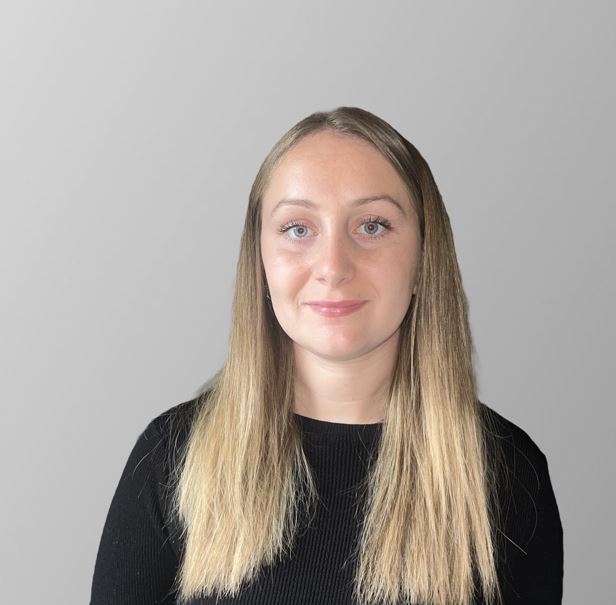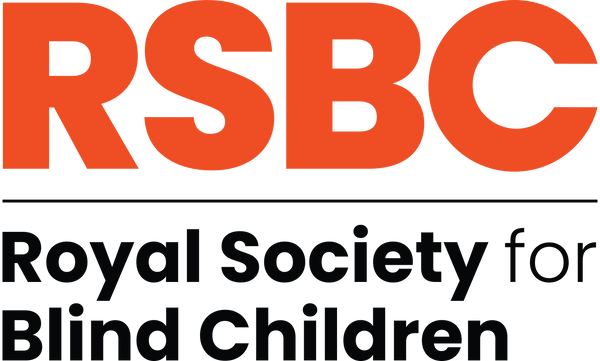
Meet Rosie, RSBC’s Habilitation Specialist
Share
A habilitation specialist plays a key role in ensuring children and young people have the skills they need to become more independent. But what exactly does the job entail? We caught up with Rosie, RSBC's habilitation specialist, to find out.
Q. Rosie, what made you decide that habilitation was the career path that was right for you?
A. I’d gained a degree in psychology, and wanted to specialise in something in education. Initially I thought I wanted to do speech and language therapy, and then I worked as a teaching assistant in a primary school.
I’d thought of going on to do a Masters degree, but that came to nothing when the Covid pandemic happened! Fortunately, one of my friends’ mums worked in a sight loss charity in Surrey, and they were looking for someone with a degree to put through a habilitation course. Although I had no real experience with vision impairment, I thought I’d give it a go. I got the job, and studied for two years at University College London.
Q. How did you progress to RSBC?
A. I stayed at the sight charity for four years, learning all the time. But the role at RSBC really appealed to me because of its diversity. When you’re a habilitation specialist at a local authority or charity, what you do is specific to one area. At RSBC, it’s very different - although you’re still focusing on things like teaching skills to sight impaired and severely sighted impaired children, you’re also providing it to families who may not have that kind of support locally. And the other activities involved, too, such as delivering vision impairment training to people around the country, really interested me.
Q. As RSBC’s habilitation specialist, what kind of activities do you typically carry out?
A. Generally, a habilitation specialist teaches children and young people between the ages of 0 to 25, teaching them any kind of functional day-to-day skills that’ll help develop and maximise their independence.
It’s very varied. A lot of the time, I’m teaching mobility, orientation or independent living skills – functional, day-to-day activities such as learning a local route to school, making their own bed or learning how to load the dishwasher.
Every child and young person’s different, so what I teach them depends on things like their level of vision, age and abilities. For example, if the child’s early primary school age, I might teach what we call ‘pre-cane’ skills – things like systematic searching techniques, so they can learn to find their toys.
I also do a lot of joint work with physiotherapists, which could involve helping to encourage children to reach for things through positional language. It’s important that children with vision impairment can learn that there's more to their world than they think, and we encourage them to explore it.
Other activities include dressing skills, such as understanding how zips and buttons work, or how to open jars and different boxes. And I do a lot of conceptual learning as well as the teaching, too – it’s a broad range.
Q. As children get older, how does the training you provide change?
A. Typically, for older children, I’d teach more advanced skills, although I carry out long cane training from any age.
It could be that the child is learning routes around their school or routes in their local area that a parent doesn't feel they’re able to do by themselves – maybe going to a shop and then buying items. I support them so that they can feel confident enough to go to the shop and find items independently, maybe by using technology or by asking the right person for assistance. So, some of what I do involves developing those self-advocacy skills. Or it could be related to using public transport – how they get on the tube in London, for example.
Each child or young person's targets are totally unique and specific to them.
Q. Delivering training is a big part of your role, too?
Yes, I deliver vision impairment awareness and sighted guide training, for example, to my colleagues at RSBC, to staff at schools where I’m working with a child, or for the parents and families of children with vision impairment. I can provide it to a workplace if a young person’s starting work experience or a new job, and I’ve carried it out for supermarket staff so that a child can access the shop independently. The training can be online or in-person.
Q. What have you enjoyed in your time so far at RSBC?
A. As a habilitation specialist, my role is to maximise a child's independence as much as possible in ways that are specific to them. I deal with all sorts of ages and abilities, so while it could mean I help a child to use public transport on their own, or help them with their long cane skills, it could also be that I help a child to be able to reach for their favourite toy on their own. It’s such a broad role, and that’s what makes is so interesting to me.
I especially like providing sighted guide training with people from our volunteers to our corporate supporters and partners. It raises awareness and gives them skills that benefit both them and people with vision impairments.
It’s also a privilege to be able to provide advice and support online to families who have no habilitation specialists locally. I can fill the gap in the meantime and provide them with strategies and activities which are fun but are also going to help their child in the longer term. That’s something they wouldn't be able to have without our service.
Q. Which teams within RSBC do you work with most closely?
A. Oh, quite a few, like our Families First team – a lot of my referrals come from them. I do a lot of joint work with our Futures service too, whether that's them referring young people to me or vice versa.
I’m trying to do more with our Activities team to make our activities more inclusive, and I work with Partnerships and Engagement, especially in relation to RSBC’s Youth Forum.
Q. How would you like to develop your role in the future?
A. I’d like to hold more events for parents and carers so that they have the skills and confidence to support their child themselves. Other habilitation specialists might support children in term time only, and when they’re not at school, their parents may not have the knowledge they need – for example, in how they can help their child in using their long cane. I’d like to have more sessions in person with children and their parents so that they can understand how I'm teaching their child and copy it at home.
Q. Is there anything else you feel people should know about your role?
A. Having a child or young person with a vision impairment in the family can throw up a lot of questions, and sometimes it can be difficult to know where to turn or what to do for the best.
I can help by pointing parents or carers in the right direction, whether it's about education or other areas they may need support in. So I’d love them to get in touch and ask, because I could provide the information they need or provide strategies that help them cope.
